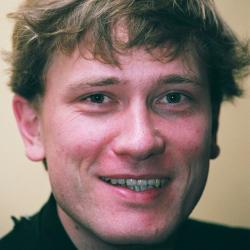Prof. Florian Hollfelder
Professor of Chemical and Synthetic Bilogy
Department of Biochemistry
Biography
Florian Hollfelder was educated at the Technical University of Berlin (Diplom-Chemiker) and Cambridge University (MPhil). After a formative stay at Stanford (with Dan Herschlag) on free-energy relationships in enzymes) he joined Tony Kirby’s group at the Chemistry Department of Cambridge University working on enzyme models and physical-organic chemistry. During his PhD he also collaborated with Dan Tawfik (on the mechanism and evaluation of model enzymes such as catalytic antibodies). His postdoctoral work at Harvard Medical School (with Chris T. Walsh) was concerned with the biosynthesis and action of the natural antibiotic microcin B17.
In 2001 he returned to Cambridge to start his own research group in the Biochemistry Department, where he is Professor in Chemical and Synthetic Biology. The group’s research centres around quantitative and mechanistic questions at the chemistry/biology interface, involving low- and high-throughput approaches.
Research
Chemical and Synthetic Biology: From Mechanism to Droplet Microfluidics (and Back)
Nature has evolved the most amazing functional biomolecules and we want to know how they work. Enzymes are the all-purpose catalysts that make the Chemistry of Life run smoothly and efficiently, under the mildest, ‘greenest’ conditions – and protein binders are involved in governing many biological processes.
The Hollfelder group is interested in gaining a fundamental understanding of the principles responsible for molecular recognition processes in chemistry and biology. We probe whether these principles enable us to describe, manipulate and ultimately make functional molecules. Using an eclectic mix of techniques we extend the mechanistic lessons learned to potential applications in biotechnology, synthetic chemistry and medicine.
We have also recently branched out into developmental biology, where we use single cell transcriptomic technologies to gain a mechanistic understanding the journey from pluripotent stem cells to more specialised cell types, as a function of environmental effects (in 3D matrices) and the general signalling environment.
Research objectives
• Develop models for protein evolution work that are instructive to answer the question "where do functional proteins come from?"
• Explain biological catalysis and molecular recognition in chemical and biophysical terms
• Create useful biocatalysts for a green transformation of industry
• Leverage droplet-based technologies to manipulate and understand cell development in a biomimetic context that gives unique biological insight by delineating reductionist models for more complex in vio scenarios
• Develop technological approaches for extreme miniaturisation of experiments (into picoliter droplets made in microfluidic devices) that help to answer chemical and biological questions?



